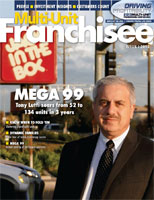Are You Financially Literate?
Review financial statements like a real pro--even if you're not
In our line of work, we see a lot of ugly financial statements. Not ugly in the sense that the business is performing poorly (well, we see some of those too!), but ugly in the sense that they contain glaring bookkeeping errors. We suspect there are several reasons for this. One is the proliferation of software that makes "doing the books yourself" attainable for almost anyone with basic computer skills. Answer a few interactive questions, choose from the drop-down list of industry choices, and you're off and running with your very own profit-and-loss statement. Press a few more buttons, and voilà, instant balance sheet!
The other reason is that many business owners consult accounting professionals only at year-end to figure out how to reduce taxes. While we're usually all for saving money (and paying no more taxes than absolutely necessary), this approach can cost dearly in the long run. First of all, if you're waiting until year-end to do tax planning, you might be waiting too long to take proactive steps. In addition, if you do the books in-house, you'll mostly save a lot of time (and not a little heartache), if you bring in a professional to help get you set up correctly from the start--and periodically review your statements to ensure accuracy.
And finally, most business owners, if they're not doing the bookkeeping themselves, are most likely in the difficult position of having to hire, train, and then manage a person in a position about which they themselves might have little or no knowledge... not an ideal situation. Then, periodically, you get to review the output of this person, again not really knowing what you should be looking for (or at).
We have entire workshops built around reviewing the numbers part of financial statements to use them to diagnose the financial performance of your business. Here is a brief primer for the "non-numbers" business owner on how to review statements to help you determine if they are, at the very least, an accurate reflection on what's happening in your business.
1) Balance sheet
Are there any unusual balances, such as:
- Negative amounts (only accumulated depreciation and amortization should be negative);
- Negative cash - should be in the form of a note payable (or bank overdraft) on the liabilities side;
- Inventory - amount should vary from month to month according to actual inventory levels (if inventory is off, then your cost of goods, net profit, and retained earning amounts will be off as well);
- Accounts receivable - should have a balance (assuming you sell on account); and
- Accounts payable - should have a positive balance (except in the unlikely event you've paid off every one of your suppliers by month-end).
2) Profit and loss
- Sales and cost of goods sold detailed for each category.
- Sales should be greater than cost of goods sold for each category.
- Cost of goods should vary each month to reflect actual expense, not estimate.
- Estimated depreciation should be entered monthly, and then reconciled to actual amount at year-end.
3) Overall look
Profit-and-loss expenses should be grouped by expense category. For example: sales and advertising expenses, employee expenses, general and administrative, and not just be listed in alphabetical order.
Add a column that shows expenses as a percentage of sales, along with year-to-date and year-to-date from previous year so you can see trends and determine real changes in your expenses, not just changes from sales increases or decreases.
And finally...
Be curious. Don't be afraid to ask questions. And if it doesn't seem right to you, get to the bottom of it! If you (or whoever you use to do your books) can't produce both an accurate profit-and-loss and a balance sheet on a monthly basis, think about outsourcing or upgrading your bookkeeping services. And if your accounting professional isn't available for large portions of the year because of tax work, or isn't capable of providing this type of advice, find one who is. We promise they're out there.
Steve LeFever is the founder and chairman of Profit Mastery, a Seattle-based eLearning company that has trained more than half a million people on how to measure and manage financial information to consistently increase business profits. Their programs have been taught around the globe and are now available online as an on-demand video program that can be accessed 24/7/365. Learn more about this educational course at www.profitmastery.net. or contact him at 800-488-3520 x14 or lefever@brs-seattle.com.
Share this Feature
Recommended Reading:
Comments:
comments powered by DisqusFRANCHISE TOPICS
- Multi-Unit Franchising
- Get Started in Franchising
- Growth
- Operations
- Open New Units
- Leadership
- Marketing
- Technology
- Legal
- Awards
- Rankings
- Trends
- Featured Franchise Stories
FEATURED IN

Multi-Unit Franchisee Magazine: Issue 1, 2013
$100,000
$250,000




 The multi-unit franchise opportunities listed above are not related to or endorsed by Multi-Unit Franchisee or Franchise Update Media Group. We are not engaged in, supporting, or endorsing any specific franchise, business opportunity, company or individual. No statement in this site is to be construed as a recommendation. We encourage prospective franchise buyers to perform extensive due diligence when considering a franchise opportunity.
The multi-unit franchise opportunities listed above are not related to or endorsed by Multi-Unit Franchisee or Franchise Update Media Group. We are not engaged in, supporting, or endorsing any specific franchise, business opportunity, company or individual. No statement in this site is to be construed as a recommendation. We encourage prospective franchise buyers to perform extensive due diligence when considering a franchise opportunity.